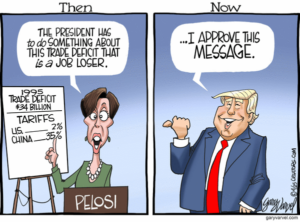Trade Tariffs: A Deep Dive into Nancy Pelosi’s Evolving Stance
Welcome to the Extreme Investor Network, where we unpack the complexities of economics and trade to help you navigate the investment landscape effectively. Today, we delve into a fascinating paradox in American politics surrounding trade tariffs—specifically focusing on the shifting perspectives of former Speaker Nancy Pelosi.
The Origins of the Debate
In 1996, Nancy Pelosi, then a relatively young congresswoman, voiced strong opposition against granting China Most Favored Nation (MFN) trade status. During a speech on the House floor, she raised concerns about the trade imbalance, job losses, and China’s human rights issues, claiming, “How far does China have to go? How much more repression? How big a trade deficit and loss of jobs to the American worker?”
At a time when bipartisan support leaned toward integrating China into the global economy, Pelosi warned that America was losing a staggering amount of jobs. She openly criticized the MFN tariffs, pointing out the chasm between the low US tariffs and the exorbitantly high tariffs imposed by China on American goods—averaging just 2% for imports from China, compared to up to 35% for American exports to China.
The Flip-Flop of Political Rhetoric
Fast forward to recent years, and we see a sharp reversal in Pelosi’s stance as tariffs were implemented under the Trump administration. What was once a policy to be championed has become a tool deemed "reckless," with Pelosi claiming these tariffs damage the economy and hurt American families. In her statements, she labeled Trump’s tariffs as “the largest tax hike on the American people in history,” effectively flipping her previous support and creating a stark contrast that calls into question the motivations behind such political maneuverings.
The Data Doesn’t Lie
The Economic Policy Institute (EPI) has presented compelling data that underlines the consequences of trade with China. Their findings suggest that the US-China trade deficit has led to an offshoring of 3.4 million jobs, predominantly in manufacturing—a sector that has faced unprecedented decline. Pelosi, whose constituency has felt the impact directly, is a case study in the complex interplay of politics, economics, and public perception.
In California, her home state, approximately 560,000 jobs have been lost to China, marking the highest job losses by any state. This stark reality contradicts the optimistic narrative often propagated by advocates of free trade.
Why This Matters
Understanding the nuances of American trade policy and the implications of tariff implementation is crucial for investors. As the landscape evolves, tracking shifts in political rhetoric and their impact on market dynamics can provide valuable insights into investment strategies. Beyond party lines, the ramifications of trade policy affect industries, job markets, and consumer prices.
Conclusion
Nancy Pelosi’s evolving stance on tariffs perfectly encapsulates the convoluted nature of political discourse and its impact on economic policy. At Extreme Investor Network, we aim to provide you with the insights you need to make informed decisions in a world where political motivations frequently cloud economic realities.
As the global trade landscape continues to unfold, we invite you to stay informed and engaged with us for ongoing updates and analysis. After all, understanding the intersection of politics and economics is vital for navigating today’s investment climate.

